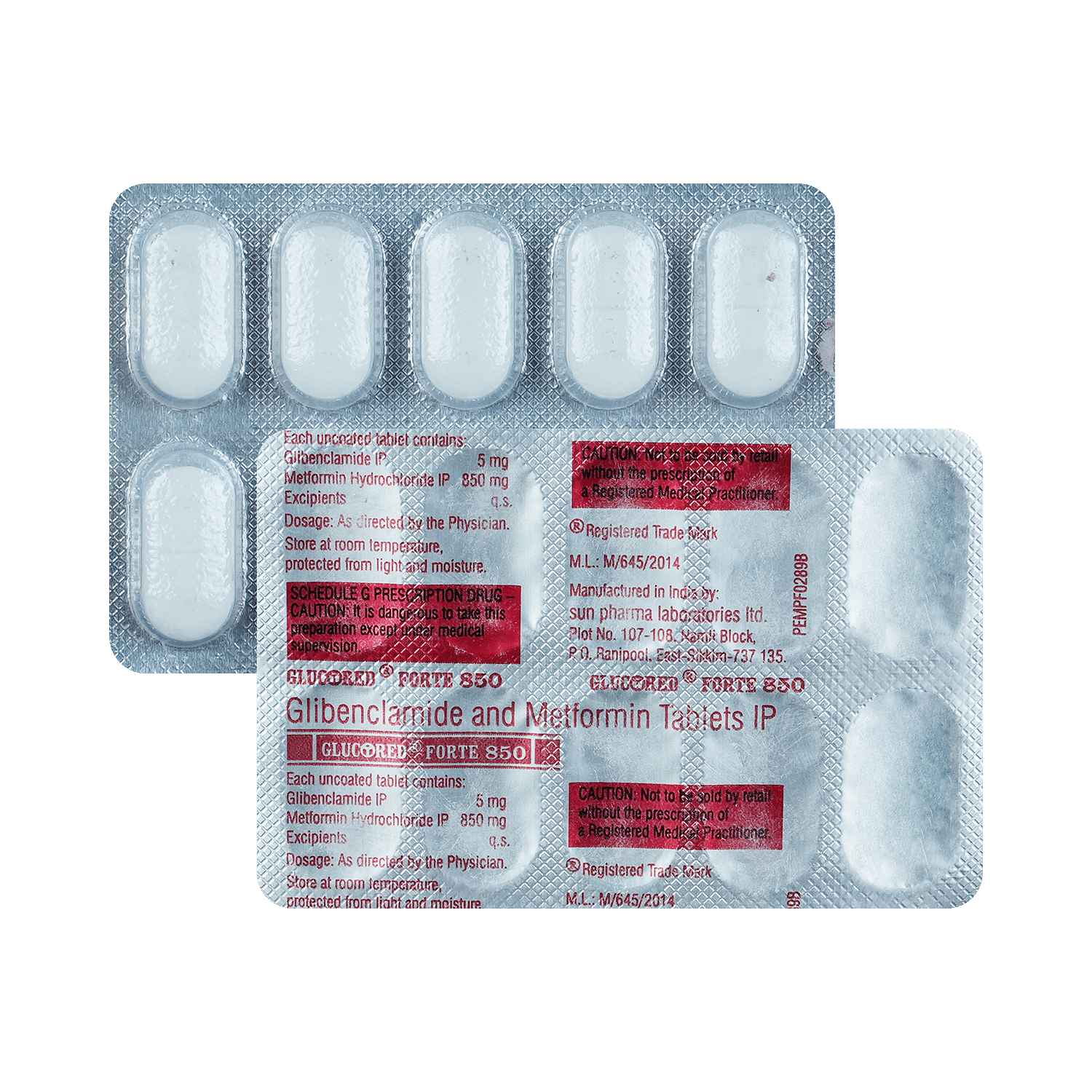
Diaclamide Forte Tablet
Manufacturer
Hicxica Formulations Pvt Ltd
Salt Composition
Glibenclamide (5mg) + Metformin (80mg)
Key Information
Short Description
Diaclamide Forte Tablet is an anti-diabetic drug used to treat type 2 diabetes mellitus in adults by controlling blood sugar levels.
Dosage Form
Tablet
Introduction
Diaclamide Forte Tablet should be taken with food and at the same time each day for maximum benefit. It is part of a comprehensive treatment plan that includes a healthy diet, regular exercise, and weight management. The most common side effect is low blood glucose levels (hypoglycemia), which can be managed by recognizing symptoms and carrying a fast-acting glucose source. Other side effects include taste changes, nausea, diarrhea, stomach pain, headache, and upper respiratory tract infection. It is not suitable for type 1 diabetes, diabetic ketoacidosis, or severe kidney or liver disease. Pregnant or breastfeeding women should consult their doctor before use.
Directions for Use
Take this medicine in the dose and duration as advised by your doctor. Swallow it whole without chewing, crushing, or breaking it. Diaclamide Forte Tablet is to be taken with food.
How it works
Diaclamide Forte Tablet is a combination of two antidiabetic medicines: Glibenclamide and Metformin.
Quick Tips
You should continue to exercise regularly, eat a healthy diet, and take your other diabetes medicines along with Diaclamide Forte Tablet. Take it with food to lower your chance of having an upset stomach. It can cause hypoglycemia (low blood sugar level) when used with other antidiabetic medicines, alcohol, or if you delay or miss a meal. Inform your doctor about your diabetes treatment if you are due to have surgery under a general anesthetic. Tell your doctor immediately if you experience any deep or rapid breathing or if you have persistent nausea, vomiting, and stomach pain as Diaclamide Forte Tablet may cause a rare but serious condition called lactic acidosis. Your doctor may check your liver function regularly. Inform your doctor if you develop symptoms such as abdominal pain, loss of appetite, or yellowing of the eyes or skin (jaundice).
Related Medicines

Dilept 5mg/850mg Tablet

G Formin Plus 5mg/850mg Tablet

Metamid Forte 5mg/850mg Tablet

Bencomet Plus 5mg/850mg Tablet

Ree Mef Forte 5mg/850mg Tablet

Glibamet 5mg/850mg Tablet

Iscept Forte 5mg/850mg Tablet

Glibedac M 5mg/850mg Tablet

Glucored Forte 850 Tablet

Glibekind M 5mg/850mg Tablet
Frequently asked questions
What is Diaclamide Forte Tablet?
Diaclamide Forte Tablet contains a combination of two medications: Glibenclamide and Metformin. This medicine is used to treat type 2 diabetes (DM). It helps improve blood glucose levels in adults when used with proper diet and exercise. Glibenclamide lowers blood glucose by increasing insulin release from the pancreas, while Metformin reduces glucose production in the liver and improves insulin sensitivity. This combination is not suitable for treating Type 1 diabetes.
What is type 2 diabetes?
Type 2 diabetes is the most common form of diabetes. It occurs when the body struggles to produce enough insulin or when the insulin it produces doesn't work properly. This leads to elevated blood glucose levels, posing serious health risks. Symptoms include frequent urination, increased thirst and hunger. Long-term complications can include neuropathy (nerve damage), nephropathy (kidney damage), retinopathy (eye damage), foot problems, and an increased risk of heart disease.
What are the possible side effects of Diaclamide Forte Tablet?
Potential side effects include hypoglycemia (low blood sugar), altered taste, nausea, stomach pain, diarrhea, headache, and upper respiratory tract infection. In some cases, this medication can cause rare but serious side effects like lactic acidosis. Long-term use may lead to vitamin B12 deficiency.
Can the use of Diaclamide Forte Tablet cause hypoglycemia?
Yes, Diaclamide Forte Tablet can cause hypoglycemia (low blood sugar level). Symptoms include nausea, headache, irritability, hunger, sweating, dizziness, fast heart rate and feelings of anxiety or shakiness. This is more likely if missed meals, alcohol consumption, exercise, or other antidiabetic medications are not managed appropriately. Regular monitoring of blood glucose levels is essential.
Can the use of Diaclamide Forte Tablet lead to Vitamin B12 deficiency?
Yes, long-term use of Diaclamide Forte Tablet can potentially cause vitamin B12 deficiency due to interference with absorption in the stomach. Untreated deficiency may lead to anemia and nerve problems, causing tingling sensations, numbness in hands and feet, weakness, urinary issues, changes in mental status, and difficulty maintaining balance (ataxia). To mitigate this risk, it is recommended to consume Vitamin B12 from external sources at least once annually.
Are there any specific conditions that should prevent the use of Diaclamide Forte Tablet?
Diaclamide Forte Tablet should not be taken by patients with known allergies to any of its components or excipients. It also needs to be avoided in those with moderate to severe kidney disease and individuals with underlying metabolic acidosis, including diabetic ketoacidosis.
Is it safe to take alcohol while taking Diaclamide Forte Tablet?
It's not safe to consume alcohol alongside Diaclamide Forte Tablet. This can lower blood sugar levels (hypoglycemia) and increases the risk of lactic acidosis.
What are the instructions for storage and disposal of Diaclamide Forte Tablet?
Store Diaclamide Forte Tablet in its original container, tightly sealed. Follow the instructions on the packaging label for proper storage conditions. Discard unused medication. Ensure it is inaccessible to pets, children, and other individuals.


